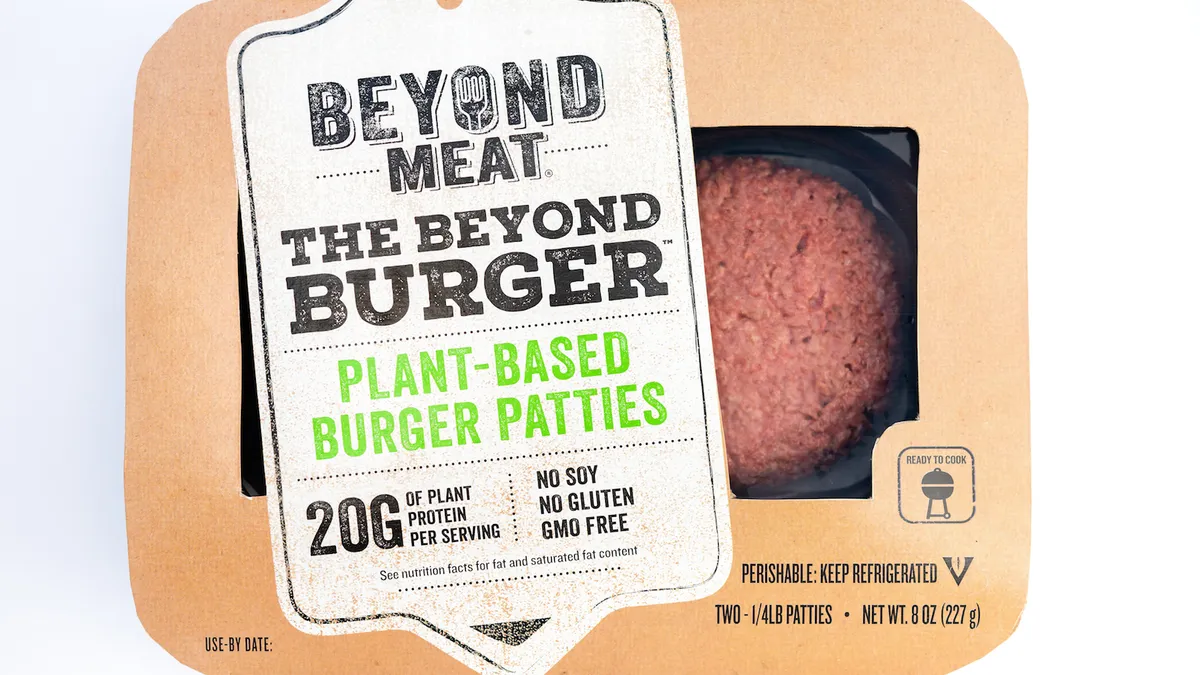Dive Brief:
- Kroger will add plant-based Beyond Burgers to the meat departments of more than 600 stores across four banners, according to Business Insider. In addition to Kroger-brand stores, the burgers will also launch in King Sooper’s, Fred Meyer and Ralph’s locations across 13 states.
- Beyond Meat, the company that makes the Beyond Burger and is backed by high-profile investors like Bill Gates and Tyson, also distributes to 350 Whole Foods stores, 280 Northern California Safeway stores, and 23 Heinen’s Fine Foods locations.
- The Beyond Burger contains no cholesterol, 20 grams of protein and half the saturated fat of a typical beef burger, according to Beyond Meat.
Dive Insight:
With distribution in Kroger stores, Beyond Meat effectively doubles the grocery footprint of its Beyond Burger. More importantly, it’s a vote of confidence from the country’s largest supermarket chain that signals the plant-based burger may finally be hitting the mainstream.
It’s been a long journey to get to this point. For years, Beyond Meat as well as competitor Impossible Foods have toiled to find the right combination of plant-based ingredients — coconut oil, wheat and potato proteins, to name a few — that mimic not just the taste but also the look, firmness and juiciness of a real burger. Executives have said they didn’t want to rush production, since getting the taste even a little bit wrong might turn people off meat substitutes for good.
Having found what they believe to be the right formula, Beyond Meat now hopes to capitalize on what it sees as a groundswell of demand. Unlike veggie burgers and tofu dogs, which have their own distinct flavor and typically appeal to vegetarian and vegan consumers, these new burgers are taking aim at meat lovers everywhere. According to industry data, an estimated 7.3 billion pounds of ground beef was purchased by food service operators and sold by stores to bring in more than $2 million in revenues in 2016. Beyond Meat and Impossible Foods are hoping to grab even a fraction of these sales, and their placement in Kroger’s meat department provides an opportunity to do just that.
The companies know their burger alternatives likely won’t sway burger aficionados. But they do see an opportunity with younger foodies, health-conscious consumers, those concerned about the environment and people simply curious to try something different. Many meat eaters are already building more plant-based foods into their diets. A 2015 report by NPD Group, Midan Marketing and Meatingplace found that 70% of consumers who eat meat are substituting a non-meat protein in their meal at least once a week. Research also shows that demand for protein-rich foods, which has been growing for several years now, is increasingly driven by plant-based alternatives.
Some big names have gotten behind burger replacements: Beyond Meat has high-profile investors like Bill Gates and Twitter co-founder Biz Stone. Tyson, which bought a 5% stake in the company last year, is helping the company expand through its industry expertise and resources.
One barrier to adoption is price, which right now stands at $5.99 for two Beyond Burger patties — twice the price of a beef burger. Also, despite their close approximation of the real deal, the new generation of plant-based burgers are still noticeably different in flavor and texture, meaning consumers may still view them as a novel alternative rather than a one-for-one substitute.
Companies will hope for more responses like those they’ve seen from restaurant clients, and from grocery accounts like Whole Foods and Safeway. After months of prodding Safeway executives to try his burgers, Beyond Meat CEO Ethan Brown finally secured a trial and was able to convince them after just a few bites. Whole Foods, meanwhile, sold so many Beyond Burgers in its early trials that the supplier had difficulty keeping up with demand.









